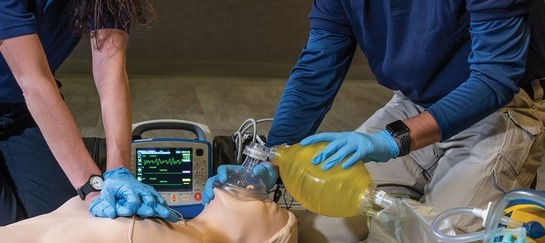
UC Nursing joins first cohort of innovative, competency-based CPR training
National League for Nursing’s program prepares students to improve cardiac arrest outcomes
University of Cincinnati (UC) College of Nursing has been accepted in the first cohort of the National League for Nursing (NLN) Change Agent for the Resuscitation Quality Improvement (RQI) program, an innovative competency-based training for high-quality cardiopulmonary resuscitation (CPR) and improved patient outcomes developed by the American Heart Association (AHA).
Nurses play an instrumental role in the management of in-hospital cardiac arrest and are often the first on the scene to identify the need for and to initiate CPR, the single biggest determinant of and the last chance for survival in a cardiac arrest emergency. Despite this knowledge, research illustrates that not all nurses are competent in CPR skills, as they decline within three to six months following conventional training.
To prepare the next generation of nurses to maximize lifesaving resuscitation competence and improve cardiac arrest outcomes, the NLN has partnered with the AHA and Laerdal Medical to offer the RQI program at no cost to nursing schools. This innovative, digital model uses realistic eSimulation patient cases and a mobile Simulation Station for quarterly psychomotor skills activities that help healthcare providers retain life-saving CPR skills.
“As an early adopter of technology and innovation in nursing education, we are glad to be one of the first colleges in the country to offer this opportunity for hands-on practice to our students, so they can graduate ready to provide safe, quality care to all,” says Denise Gormley, PhD, RN, FAANP, interim dean of the UC College of Nursing.
In the United States, only 25% of patients survive an in-hospital cardiac arrest; just 10% survive out-of-hospital emergencies. High-quality CPR is the single highest determinant of survival from cardiac arrest.
Tags
Related Stories
Putting it all together: The UC Nursing capstone experience
May 5, 2025
During the BSN final semester, all knowledge and experience acquired comes together at the Capstone course. Through this experience, students reflect on their academic and clinical journey and design an evidence-based project that connects their education with the realities of professional practice. Whether focused on improving patient outcomes, enhancing nursing workflows, promoting professional development, or impacting community health, the capstone project challenges students to think critically, act creatively and demonstrate their readiness to enter the nursing profession.
Machine learning brings new insights to cell’s role in...
April 30, 2025
Researchers led by the University of Cincinnati’s Anna Kruyer and the University of Houston’s Demetrio Labate have published research in the journal Science Advances applying object recognition technology to track changes in brain cell structure and provide new insights into how the brain responds to heroin use, withdrawal and relapse.
Most teens prescribed SSRIs did not have recommended follow-up...
April 30, 2025
The University of Cincinnati and Cincinnati Children's Hospital Medical Center's Martine Lamy commented to Medscape on new research that found fewer than half of the adolescents prescribed a selective serotonin reuptake inhibitor (SSRI) at two large Chicago pediatric primary care clinics had a follow-up visit within the recommended 6 weeks.
